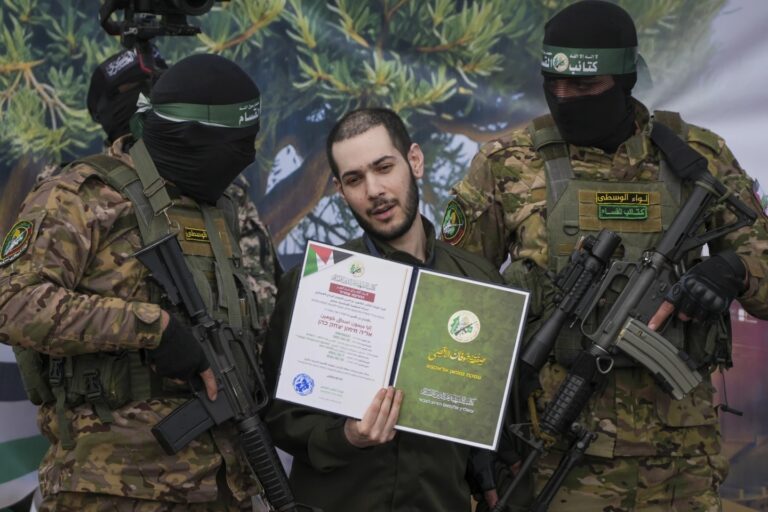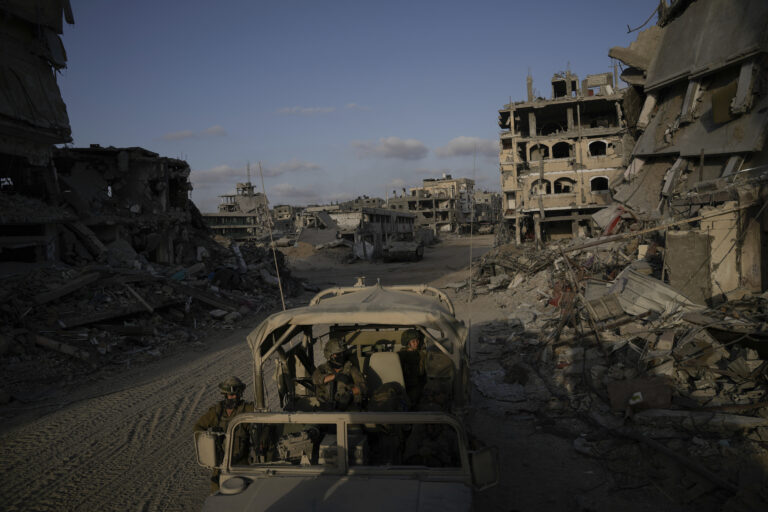 Fierce clashes between police and protesters shattered a brief truce in Ukraine’s besieged capital Thursday, leaving at least 22 people dead. Government snipers were reported to be shooting at some of the protesters.
Fierce clashes between police and protesters shattered a brief truce in Ukraine’s besieged capital Thursday, leaving at least 22 people dead. Government snipers were reported to be shooting at some of the protesters.
The deaths in Kiev came in a new eruption of violence just hours after the country’s embattled president and the opposition leaders demanding his resignation called for a truce and negotiations to try to resolve Ukraine’s protracted political crisis.
The two sides are locked in a decades-long battle over the identity of this nation of 46 million, whose loyalties are divided between Russia and the West. Parts of the country— mostly in its western cities — are in open revolt against President Viktor Yanukovych’s central government.
An Associated Press reporter saw 21 bodies Thursday laid out on the edge of the sprawling protest encampment in central Kiev. In addition, one policeman was killed and 28 suffered gunshot wounds Thursday, Interior Ministry spokesman Serhiy Burlakov told the AP. Government snipers were seen shooting at some protesters in Kiev, according to an AP cameraman and a protester.
The deaths Thursday brought the week’s toll to at least 50 in Kiev, with hundreds injured.
Shocked by the violence, the chief of Kiev’s city administration, Volodymyr Makeyenko, said Thursday he was leaving Yanukovych’s Party of Regions.
“We must be guided only by the interests of the people, this is our only chance to save people’s lives,” he said, adding he would continue to fulfill his duties as long as he had the people’s trust.
As the violence exploded and heavy smoke from burning barricades at the encampment belched into the sky, the foreign ministers of three European countries met with Yanukovych, after their meeting with the opposition leaders.
Neither side appears willing to compromise, with the opposition insisting on Yanukovych’s resignation and an early election and the president apparently prepared to fight until the end.
Later Thursday in Brussels, the 28-nation European Union was scheduled to hold an emergency meeting on Ukraine, to consider sanctions against those behind the violence.
The latest bout of street violence began Tuesday when protesters attacked police lines and set fires outside parliament, accusing Yanukovych of ignoring their demands to enact constitutional reforms that would limit the president’s power — a key opposition demand. Parliament, dominated by his supporters, was stalling on taking up a constitutional reform.
In a statement early Thursday, the Ukrainian Health Ministry said 28 people have died and 287 have been hospitalized during the two days of street violence. Protesters, who have set up a medical care facility in a downtown cathedral so that wounded colleagues would not be snatched by police at the hospital, say the numbers of injured are significantly higher — possibly double or triple that.
A statement from the Interior Ministry on Thursday said the gunfire against officers appeared to be coming from the national music conservatory in Kiev, which is on the edge of the downtown square housing an extensive protest tent camp.
Also Thursday, the parliament building was evacuated because of fears protesters were preparing to storm it.
At the Winter Olympics in Sochi, Ukrainian alpine skier Bogdana Matsotska, 24, said she will not take part in Friday’s women’s slalom to protest the developments in Kiev.
“As a protest against lawless actions made toward protesters, the lack of responsibility from the side of the president and his lackey government, we refuse further performance at the 2014 Sochi Olympic Games,” her father and coach, Oleg Matsotskyy, wrote in a Facebook post.
The clashes this week have been the most deadly since protests kicked off three months ago after Yanukovych shelved an association agreement with the European Union in favor of closer ties with Russia. Russia then announced a $15 billion bailout for Ukraine, whose economy is in tatters.
Although the initial weeks of protests were peaceful, radicals helped drive an outburst of clashes with police in January in which at least three people died, and the day of violence Tuesday may have radicalized many more.
Political and diplomatic maneuvering has continued, with both Moscow and the West eager to gain influence over this former Soviet republic. Three EU foreign ministers — from Germany, France and Poland — were in Kiev on Thursday speaking with both sides.
President Barack Obama also stepped in to condemn the violence, warning Wednesday “there will be consequences” for Ukraine if it continues. The U.S. has raised the prospect of joining with the EU to impose sanctions against Ukraine.
Russia’s Foreign Ministry, meanwhile, described the violence as an attempted coup and even used the phrase “brown revolution,” an allusion to the Nazi rise to power in Germany in 1933. The ministry said Russia would use “all our influence to restore peace and calm.”
(AP)










